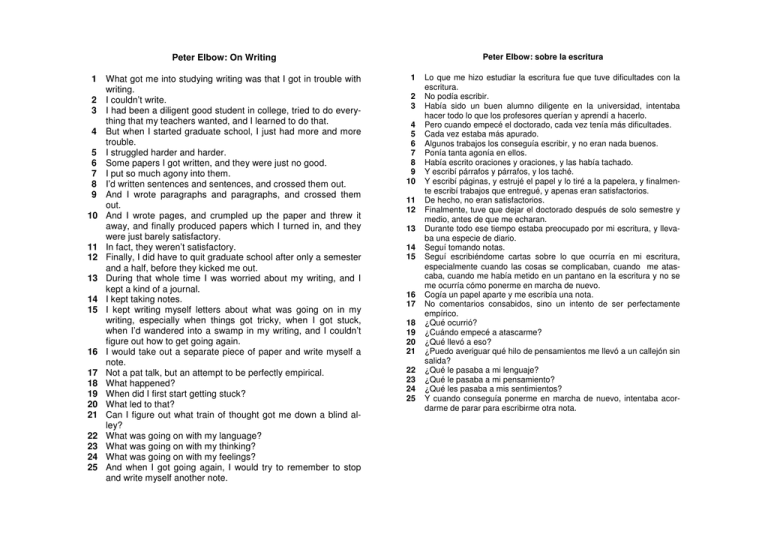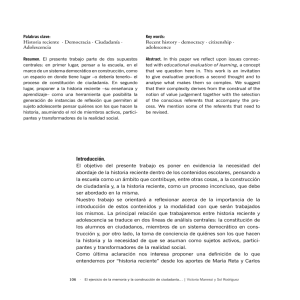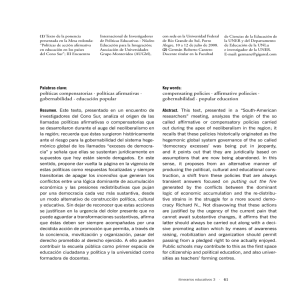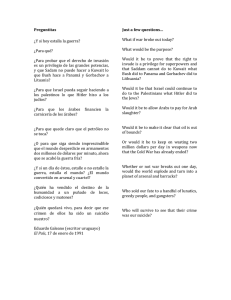Peter Elbow: On Writing 1 What got me into studying writing was that
Anuncio

Peter Elbow: sobre la escritura Peter Elbow: On Writing 1 2 3 4 5 6 7 8 9 10 11 12 13 14 15 16 17 18 19 20 21 22 23 24 25 What got me into studying writing was that I got in trouble with writing. I couldn’t write. I had been a diligent good student in college, tried to do everything that my teachers wanted, and I learned to do that. But when I started graduate school, I just had more and more trouble. I struggled harder and harder. Some papers I got written, and they were just no good. I put so much agony into them. I’d written sentences and sentences, and crossed them out. And I wrote paragraphs and paragraphs, and crossed them out. And I wrote pages, and crumpled up the paper and threw it away, and finally produced papers which I turned in, and they were just barely satisfactory. In fact, they weren’t satisfactory. Finally, I did have to quit graduate school after only a semester and a half, before they kicked me out. During that whole time I was worried about my writing, and I kept a kind of a journal. I kept taking notes. I kept writing myself letters about what was going on in my writing, especially when things got tricky, when I got stuck, when I’d wandered into a swamp in my writing, and I couldn’t figure out how to get going again. I would take out a separate piece of paper and write myself a note. Not a pat talk, but an attempt to be perfectly empirical. What happened? When did I first start getting stuck? What led to that? Can I figure out what train of thought got me down a blind alley? What was going on with my language? What was going on with my thinking? What was going on with my feelings? And when I got going again, I would try to remember to stop and write myself another note. 1 2 3 4 5 6 7 8 9 10 11 12 13 14 15 16 17 18 19 20 21 22 23 24 25 Lo que me hizo estudiar la escritura fue que tuve dificultades con la escritura. No podía escribir. Había sido un buen alumno diligente en la universidad, intentaba hacer todo lo que los profesores querían y aprendí a hacerlo. Pero cuando empecé el doctorado, cada vez tenía más dificultades. Cada vez estaba más apurado. Algunos trabajos los conseguía escribir, y no eran nada buenos. Ponía tanta agonía en ellos. Había escrito oraciones y oraciones, y las había tachado. Y escribí párrafos y párrafos, y los taché. Y escribí páginas, y estrujé el papel y lo tiré a la papelera, y finalmente escribí trabajos que entregué, y apenas eran satisfactorios. De hecho, no eran satisfactorios. Finalmente, tuve que dejar el doctorado después de solo semestre y medio, antes de que me echaran. Durante todo ese tiempo estaba preocupado por mi escritura, y llevaba una especie de diario. Seguí tomando notas. Seguí escribiéndome cartas sobre lo que ocurría en mi escritura, especialmente cuando las cosas se complicaban, cuando me atascaba, cuando me había metido en un pantano en la escritura y no se me ocurría cómo ponerme en marcha de nuevo. Cogía un papel aparte y me escribía una nota. No comentarios consabidos, sino un intento de ser perfectamente empírico. ¿Qué ocurrió? ¿Cuándo empecé a atascarme? ¿Qué llevó a eso? ¿Puedo averiguar qué hilo de pensamientos me llevó a un callejón sin salida? ¿Qué le pasaba a mi lenguaje? ¿Qué le pasaba a mi pensamiento? ¿Qué les pasaba a mis sentimientos? Y cuando conseguía ponerme en marcha de nuevo, intentaba acordarme de parar para escribirme otra nota. PETER ELBOW: ON WRITING 26 How did I get out of here? 27 What was the turning point? 28 Was there something I did that helped me get out of the stuck point? 29 Well, I wrote myself those notes for three years, and kept slipping them in a folder, until that folder got to be very fat and full of notes. 30 Some of them were written on the back of envelopes, but I was getting very interested in what was in there. 31 I didn’t have much time to explore it, but that folder of notes to myself is what turned into my first book about writing, and turned into my first study of the writing process. 32 But the main thing I learned, at least the first thing I learned, is that I had to abandon what seemed like the main premise in writing, which is that… the theory that you have to get things clear in your mind ahead of time, that you have to know what you’re writing about before you get going. 33 And, of course, people always said, “Make an outline. An outline is a perfect way to figure out what you’re… what you want to say. For getting your thought clear in mind ahead of time, make an outline.” 34 But I had enormous difficulties making an outline. 35 Either I didn’t have very much in mind, and so I couldn’t put much into the outline, or as I got more thoughts, I couldn’t figure out how to get them well outlined. 36 Or sometimes I actually succeeded in making an outline after a great deal of effort, but then trying to write from an outline was a tangle. 37 I had this lovely outline, but when I went through the writing, I would… kept departing from the outline. 38 It just kept tying itself in knots. 39 The outline didn’t work. 40 Somehow the words of the writing and the words of the outline were in different universes, and they didn’t fit together. 41 So what I learned was that I needed to skip this principle of getting things clear in mind ahead of time. 42 I need to plunge in on my writing before I know what I’m really trying to say. 43 I needed to make a mess. PETER ELBOW: SOBRE LA ESCRITURA 26 27 28 29 30 31 32 33 34 35 36 37 38 39 40 41 42 43 ¿Cómo salí de aquí? ¿Cuál fue el momento decisivo? ¿Hubo algo que hice que me ayudó a salir del atasco? Bien, estuve tres años escribiéndome esas notas y las seguí pasando a una carpeta, hasta que esa carpeta llegó a estar muy gorda y llena de notas. Algunas estaban escritas en el dorso de sobres, pero estaba empezando a sentir mucho interés por lo que había ahí. No tenía mucho tiempo para explorarla, pero esa carpeta de notas es lo que se convirtió en mi primer libro sobre la escritura, y se convirtió en mi primer estudio del proceso de la escritura. Pero lo principal que aprendí, al menos lo primero que aprendí, es que tenía que abandonar lo que parecía la premisa principal en la escritura, que es que… la teoría de que tienes que tener las cosas claras en la cabeza antes de empezar, que tienes que saber de qué vas a escribir antes de ponerte en marcha. Y, por supuesto, la gente siempre decía: «Haz un esquema. Un esquema es la forma perfecta de averiguar lo que… lo que quieres decir. Para tener los pensamientos claros en la cabeza antes de empezar, haz un esquema». Pero yo tenía dificultades enormes para hacer un esquema. O bien no tenía muchas ideas en la cabeza, así que no podía poner mucho en el esquema, o cuando tenía más pensamientos, no podía resolver cómo ponerlos bien en un esquema. O a veces sí acertaba a hacer un esquema después de mucho esfuerzo, pero luego intentar escribir a partir del esquema resultaba un lío. Tenía este esquema maravilloso, pero cuando me metía en la escritura… todo el tiempo me apartaba del esquema. Se hacía un lío. El esquema no funcionaba. Por alguna razón, las palabras del texto y las palabras del esquema estaban en universos diferentes, y no encajaban. Así que lo que aprendí fue que necesitaba saltarme este principio de tener las cosas claras en la cabeza antes de empezar. Necesito lanzarme a la escritura antes de saber qué es lo que en realidad intento decir. Necesito hacer un caos. PETER ELBOW: ON WRITING 44 Making a mess is the quickest way to say it, and it’s the… “Make a mess” is a concept that I cling to most fervently; that if I let myself make a mess, it’ll go somewhere. 45 If I let myself keep writing, even when I don’t know where I’m going, I end up going somewhere. That… 46 So I had to gradually give myself permission, because this is what I discovered when I was doing all this empirical observation of my writing: 47 that all my efforts to try and get things clear ahead of time tied me into knots, and all… whenever I stumbled into the process of giving myself permission to just go rambling on, just go forging ahead to the I-don’t-know-what, those almost always led me somewhere; 48 led to a lot of extra words, but I saved time, even though I wrote down a lot of extra words and made a big mess. 49 I saved time in writing a paper. 50 That forging on into the unknown and doing a lot of freewriting eventually led to clarity. 51 So what’s the essential psychological fact about writing for me? 52 It grows out of this experience of watching myself write, and trying to figure out when I get tied in knots and when I don’t get tied in knots. 53 And I think it has to do with the fact that there’s two essential muscles, two essential processes that get involved in writing. 54 One is the process of opening the doors. 55 That’s where making a mess comes in, allowing a mess to occur; opening the doors, asking for input, inviting in the maximum amount, a maximum amount of thinking words, just letting words come out. 56 So that… I’ve tended to call that the creative move, the generative move, the generative muscle, the creative muscle. 57 That… you can’t write anything unless you generate a lot, a lot, a lot. 58 And you just need to take everything that comes, and not worry whether it’s any good. 59 But the trouble is, you can’t write anything that works very well unless you emphasize the other muscle, which is the clinching, critical, logical, nay-saying muscle, that says, “Wait a minute. Is this any good? It doesn’t work. That’s wrong. It’s just wordy. It’s not good.” PETER ELBOW: SOBRE LA ESCRITURA 44 45 46 47 48 49 50 51 52 53 54 55 56 57 58 59 Hacer un caos es la manera más rápida de decirlo, y es la… «Hacer un caos» es un concepto al que me aferro con todo fervor; que si me permito hacer un caos, llegaré a algún sitio. Si me permito seguir escribiendo, incluso cuando no sé adónde voy, termino llegando a alguna parte. Que… Así que tuve que darme permiso paulatinamente, porque esto es lo que descubrí cuando hacía toda esta observación empírica de mi escritura: que todos mis esfuerzos por intentar tener las cosas claras antes de empezar me metían en un lío, y cada… cada vez que tropezaba con el proceso de darme permiso para simplemente ir divagando, para simplemente ir avanzando hacia el nosequé, esos casi siempre me llevaban a algún sitio; llevaban a un montón de palabras de más, pero ahorraba tiempo, a pesar de que escribía un montón de palabras de más y creaba un gran caos. Ahorraba tiempo al escribir un trabajo. Ese avanzar hacia lo desconocido y hacer un montón de escritura libre al final conducían hacia la claridad. ¿Entonces cuál es la realidad sicológica esencial sobre la escritura para mí? Surge de esta experiencia de observarme a mí mismo escribiendo y de intentar entender cuándo me hago un lío y cuándo no me hago un lío. Y creo que tiene que ver con el hecho de que hay dos músculos esenciales, dos procesos esenciales que están implicados en la escritura. Uno es el proceso de abrir las puertas. Ahí es donde entra lo de hacer un caos, dejar que el caos ocurra; abrir las puertas, pedir que entren cosas, invitar la máxima cantidad, la máxima cantidad de palabras con ideas, simplemente dejar que las palabras salgan. Así que… Suelo llamarlo el movimiento creativo, el movimiento generativo, el músculo generativo, el músculo creativo. Que… no puedes escribir nada a menos que generes un montón, un montón, un montón. Y tienes que aceptar todo lo que venga, y no preocuparte de si es bueno. Pero el problema es que no puedes escribir nada que funcione muy bien, a menos que hagas hincapié en el otro músculo, que es el músculo concluyente, crítico, lógico, que dice que no, que dice: «Un momento. ¿Está bien esto? No funciona. Está mal. Es prolijo. No está bien». PETER ELBOW: ON WRITING 60 Unfortunately, you need to be critical. 61 At certain magical moments, you can do those two things at the same time, when everything goes magically well, but most of the time I find, and I see this in my students too, it helps enormously to do those two processes one at a time, one at a time. 62 To accept the garbage, to be generative, to make a mess, and after you have a lot of rich material, too much, then turn around and be critical and nasty. 63 And then engage in organizing too, and try to figure out what goes where. 64 When I have something to write, what I’ve learned is that I need to sit down for five-, and ten-, and fifteen-minute bits early. 65 I need to just get one quick thought down. 66 In fact, what I… what really helps me is, if I’m walking around, or if I’m taking a shower, or if I’m eating a meal, I just have one little thought about that assignment, and I just need to take out a piece of paper and jot that down, and sometimes it’s two sentences, and sometimes it’s ten sentences, but that’s enough. 67 If I can do that four or five times for some major piece of writing; or if it’s a small piece of writing, if I can do that a couple of times, then when I sit down for the genuine draft, I’ve got so much more, I’m so much further ahead. 68 So perhaps the most practically helpful thing I’ve learned is to get very very short pieces of writing done early in. 69 Just make a little pile of those for when I sit down to write a draft. PETER ELBOW: SOBRE LA ESCRITURA 60 61 62 63 64 65 66 67 68 69 Por desgracia, tienes que ser crítico. En ciertos momentos mágicos, puedes hacer esas dos cosas al mismo tiempo, cuando todo va mágicamente bien, pero la mayoría de las veces encuentro que, y veo esto en mis alumnos también, que ayuda enormemente hacer esos dos procesos de uno en uno, por separado. Aceptar las tonterías, ser generativo, hacer un caos, y una vez que tengas un montón de material rico, demasiado, entonces dar la vuelta y ser crítico y cruel. Y entonces meterse a organizar también, e intentar resolver qué va dónde. Cuando tengo algo que escribir, lo que he aprendido es que necesito sentarme durante periodos de cinco, diez y quince minutos al principio. Necesito simplemente anotar un pensamiento rápido. De hecho, lo que… lo que de veras me ayuda es, si estoy paseando, o si estoy duchándome o comiendo, se me ocurre algún pensamiento sobre ese trabajo, y tengo que sacar un papel y anotarlo, y unas veces son dos oraciones, otras veces son diez oraciones, pero con eso basta. Si puedo hacer eso cuatro o cinco veces para un trabajo grande; o si es un trabajo pequeño, si puedo hacer eso un par de veces, luego, cuando me siento para la redacción auténtica, tengo mucho más, estoy mucho más adelantado. Así que quizá lo más útil en la práctica que he aprendido es escribir textos muy muy cortos al principio. Simplemente hacer un montoncito de ellos para cuando me siente a escribir un borrador.


